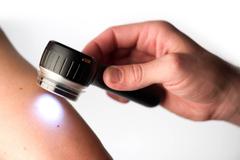Queensland is still considered the ‘Skin Cancer Capital of the World’. We discuss what you need to know about Skin Cancer and getting your skin checked.
What is Skin Cancer?
Skin Cancer occurs when particular cells in certain layers of the skin change (become abnormal) in response to exposure to UV radiation (sun) over time. Our skin is made up of 3 layers. The outermost layer is called the epidermis. Within this layer there are different types of cells:
- Barrier cells called Keratinocytes that develop at the base layer of the epidermis and then are stacked on top of each other.
- Pigmented cells (cells that produce coloured particles) called Melanocytes
Skin cancer is broadly classified by which type of cell they effect and where in the epidermis these cells are affected.
When UV exposure causes changes in Keratinocyte cells at the base of the epidermis, the type of skin cancer that results is called a Basal Cell Carcinoma (BCC). When abnormalities occur in Keratinocyte cells above the basal layer of cells in the epidermis, it is called a Squamous Cell Carcinoma (SCC). BCC and SCCs are occasionally described together as ‘Non Melanoma Skin Cancers’.
When UV exposure causes changes in the Melanocyte cells at the bottom of the epidermis, the type of skin cancer that results is a Melanoma.
Melanoma, BCC and SCC are 3 distinct types of skin cancer. One does not cause or lead to the other.
How to prevent skin cancer
The single greatest risk factor for skin cancer is excessive exposure to UV radiation from the sun (or solariums). Minimising UV exposure through sun avoidance or using effective sun protection (slip slop slap) has been shown to prevent the development of skin cancer.
Am I at risk of skin Cancer?
Anyone can develop skin cancer, irrespective of your skin type or whether you have ever been sun burnt.
Besides sun exposure, there are some other factors that make an individual more at risk of skin cancer. These include –
- fair skin and hair
- a large number of moles
- a weakened immune system
- a family history of melanoma
- a previous personal diagnosis of melanoma
Should I get a skin check?
Survival rates for skin cancer improve with early detection. The earlier that a skin cancer is diagnosed and treated, the greater the chance of survival.
It is important to be familiar with your skin. You should perform self skin examination of your whole body, including your scalp, hands and feet regularly, perhaps once a season. You may need to use the help of a hand mirror or a family member to check areas you can’t easily see.
Changes to look for include:
- new moles or spots
- any ‘spot’ that is increasing in size, changing in colour or changing in shape
- any ‘spot’ that becomes raised, lumpy, scaly or ulcerated
- any ‘spot’ that itches, bleeds or weeps
- any ‘spot’ that just looks different to the others (i.e. the ‘ugly duckling’)
If you notice any of these changes, make sure you see your GP to have the ‘spot’ checked.
A minimum yearly review of your skin by your local doctor will help with prevention or early diagnosis of skin cancer. 
GPs have the knowledge and skills to perform skin checks and any necessary minor procedures for patients e.g. biopsies of skin lesions or cryotherapy (“freeze” treatment) to any precancerous lesions. They will also discuss with you your individual skin cancer risk and provide advice on how often you require a skin check. Dermatologists are specialists trained specifically in medicine related to the skin. Patients who require more complex care may be referred to a dermatologist by their GP.
What does a skin check entail?
A skin check is often a slightly longer appointment than your standard consultation. You will be required to remove your clothing down to your undergarments. You should not wear any makeup, fake tan or creams to your appointment. Your doctor will use magnifying tools to inspect all the areas of your skin thoroughly. If your doctor identifies any ‘spots’ that are suspicious of a skin cancer or pre-skin cancer, they may suggest a minor procedure such as a biopsy. This is when local anaesthetic is administered using a needle, and then a small sample of the skin is removed. This sample is sent to a laboratory where it is inspected under a microscope to check for cancerous cell changes.
What if I am diagnosed with a skin cancer?
There are many different treatment options for skin cancer. Your GP will advise the best treatment depending on the type of skin cancer and your own personal health factors.
BCCs are slow growing skin cancers that almost always are cured by treatment and very rarely metastasise (spread to other parts of the body). If left untreated however, they can grow and damage or destroy the skin and surrounding tissues, which may result in serious complications.
SCCs are also usually easily treated, however unlike BCCs, some can metastasise causing secondary tumours in other organs
Melanomas, if not detected early, have the capacity to metastasise easily causing secondary tumours in other parts of the body which may result in adverse health outcomes.
How do I book a skin check?
Skin checks can be performed at any time of the year. If you would like your skin checked, are due for your annual GP skin check or are concerned about any spots on your skin phone your GP to book an appointment for a full skin check, or select ‘skin check’ when booking online.
